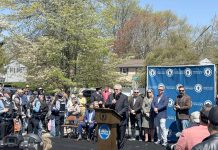
By Allison Perrine
RED BANK – It was a blunt and honest conversation last Wednesday night during the Red Bank Public Library’s most recent installment of its Let’s Talk About Race program, as panelists and attendees discussed racism, white supremacy and Christianity.
Guest speakers for the virtual program included Rev. Diane Ford of Lincroft Presbyterian Church, Minister Kerwin Webb of Second Baptist Church of Asbury Park and Rashaun Booker of Antioch AME Zion Church of Linden. The event ran for nearly two hours and none of that time was spent beating around the bush.
While majority of the night centered around white people and Christians, racist ideologies are “not just exclusively in white churches,” Webb said. Everyone has unconscious biases to some degree and it’s important to address them and work on them through understanding and education.
“We’ve sold ourself as a country for all and honestly it’s never been like that. From the beginning of time with our indigenous people, white people have always been the privileged race,” said Linda Hewitt, circulation supervisor and outreach and programming coordinator with the library. “Often our program focuses on racism regarding the Black and white communities but systemic racism is across the board and it affects all of us.”
The speakers delved deeper into this idea, starting with Ford who addressed the first time she was made aware of her white privilege. While in seminary school in a large classroom, a Black student in his 40s said he hoped that his children would live in a better world. Ford didn’t understand what he meant by that.
“And that was it. It was one of those epiphanies,” she said.
Ford spent most of her time discussing written works by one of her former professors from Union Theological Seminary in New York, James Cone, who she said “put Black theology on the map.” In his book, “The Cross and the Lynching Tree,” Cone draws connections between crucifixions and lynching – which terrorized, shamed and tortured its victims.
According to Cone, “The cross has been transformed into a harmless non-offensive ornament that Christians wear around their necks rather than reminding us of the cost of discipleship.”
“Until we can see the cross and the lynching tree together, until we can identify Christ with a ‘recrucified’ Black body hanging from a lynching tree, there can be no genuine understanding of Christian identity in America and no deliverance from the brutal legacy of slavery and white supremacy.”
“It’s a peculiar relationship that the Christian faith has with white supremacy, with the history of America and racism,” said Webb, who is also the president of the Greater Red Bank Area NAACP. He spent some of his time reading “Black and White,” published in 1874 by T. Thomas Fortune, a Black writer and activist.
The takeaway? “Christians are late to the party at best and tools of oppression at worst,” Webb said. But each individual is different and faith is not defined by which church a person goes to but by the works that they do and the words that they say.
“There are those who wear the Christian jersey because it brings riches, money, fame, power… and scripture tells that those people will show themselves in due time. It is our jobs as those who profess to be Christians, those who claim to be Christian, to live out the ways and the works of Jesus so others can see and know the difference,” said Webb.
Booker got down to the “why” of the conversation during his segment. Why is Christianity “very compatible” with racism, he probed? Because it’s run by people and people have problems with accountability, he said. And that stems partly from education.
“When we look at the curriculum that’s created, we create people who grow up to only want to listen to some leader. We’re creating workers. You’re going to go out in the world and you’re going to work, and you’re going to do that under a leader and you’re not going to question any of that,” he said. “When we look at our school system, we’re not necessarily creating independent thinkers.”
He added that there are some people “masking” as Christians and saying they follow that religion because their family members follow it. It can make it “easy for people to still be racist and be a Christian,” Booker said. That’s where accountability comes into play, which applies to the church leaders and pastors as well.
But Booker, along with the other speakers and some attendees, said he has hope for the future that things can change and that people can improve themselves. Recently, he created a TikTok account on social media as part of a goal for this Lenten season. Why? So that he can notice trends and have conversations with users, especially younger people, on the platforms they’re already utilizing, and spread messages of peace.
“We can show them love. I think it’s really simple when we are showing love in the very, very little things,” said Booker. “I think that sometimes we think we have to do so many things that are so dramatic.” But little things could mean a call, a text or, in Booker’s case, a TikTok video. Whatever it is, he is sure to bring the Bible forward and give inspiration to those seeing his messages, he said.
This article originally appeared in the March 4-10, 2021, print edition of The Two River Times.














